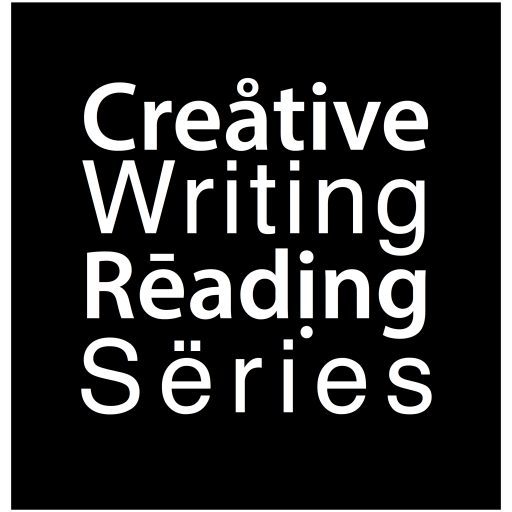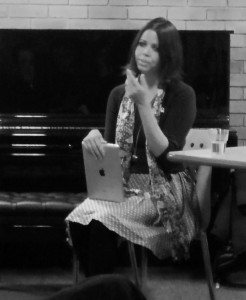Wednesday evening gave us a rare glimpse into a work in progress. Pariat’s first novel, Seahorse, is due for publication in November. Now in the editing stage, this is writing fresh from the wellspring. Instead of a crisp reading copy flagged with bookmarks, the author read extracts of the draft straight from her iPad.
The protagonist of Seahorse is Nehemiah, a young man whose tutor and lover, Nicholas, suddenly and mysteriously disappears. Pariat’s first extract told of this abrupt absence, of the narrator’s visit to Nicholas’ deserted bungalow, ‘the table set for ghosts’, the space uncluttered and uninhabited, the aquarium empty, the books, once littering surfaces, now gone. But as we learn, ‘this was not death’ which leaves behind ‘accumulated belongings’ as mementos of a life; instead ‘it was as though he had never existed’, as if a tide had come and ‘washed away completely’ all traces. The loss, and its accompanying hope of reunion, follow the narrator through the 1990s in Delhi and across several years to a new life London. ‘We are shaped by absence’, Nehemiah claims, ‘spaces in the trellis by which we trail’.
In a second excerpt, organic and aquatic imagery gave way to the tremulous sexual tensions of hot-housed university students. 90’s India, Pariat explained, was undergoing a ‘swift and sweeping liberalisation’; caught up in the clamour, Nehemiah and his fellow students vie to give the appearance of joining in. Young men swap ‘cigarettes, alcohol and lies’ and watch adult films on late night cable, fantasising over the ‘montage of flesh and desire’ where intimacy segues seamlessly from initial embraces to rumpled bed-sheets. In this haze of hormones and longing ‘everything was sexualised, yet it was impossible to talk about sex’.
Later, desire and incompleteness merge in an unexpected way when Nehemiah muses on Michelangelo’s David. Here is perfection in stone, dominating the gallery where it stands. Yet in the next room, an unfinished work by the same hand shows figures of prisoners emerging from stone whose half-formed presence ‘will not stun you to silence, but rouse you to it’. Here is the unconsummated, yet tangible: ‘endless metaphor and infinite possibility’. This is a quality that the narrator recognises in himself. We are all ‘unconcluded’, and thus we are ‘full of possibility’. David, for all his power, ‘will only ever be David’.
What might seem a passing nod to classicist sculpture takes on a deeper resonance when the novel’s underlying themes are unpacked. Seahorse is a reworking of the myth of Poseidon and his lover, Pelops, a young man who becomes cupbearer to the underwater god and ultimately wins the daughter of a tyrannical king. As Pariat pointed out, Pelops was sacrificed by his father and served up as a supper to the Olympians, who discovered the nature of the dish and had the boy restored to life. As his shoulder had already been eaten, Pelops could never be completely whole. Absence and loss, breaking and repair, love and violence. Grisly myths and watery worlds. Answering questions about the writing process, Pariat stated that ‘a writer is like an orthodontist, setting and resetting, breaking and mangling’ to find the form a story must take. In the case of Seahorse, Pariat planned to write a novella and ultimately created a larger story, one which ‘unfurled’ and could not be readily contained. There were evidently bigger bones to deal with.
Like the language of the novel itself, Pariat’s voice contained the subtle nuances of literary English and the rhythms of traditional Indian storytelling. It was one of those sweet, melodic voices that could entrance an audience by reading the phonebook, but given the material, we were near hypnosis. At the end of the reading, a colleague turned to me seeking a metaphor for Pariat’s delivery. ‘Honey in the ear’, I replied. ‘Yes’ she said, ‘but all that breaking and cracking!’
Seahorse will be published by Vintage Books, Random House India later this year.
Janice Pariat is the current Wallace Trust Fellow at Kent. She is editor of the literary journal Pyrta, is widely published as a poet, reviewer and cultural journalist in magazines and newspapers, and won awards for her 2012 short story collection, Boats on Land. She divides her time between Delhi and London.
Janice Pariat will be talking more about her work and its relationship to oral story traditions on Thursday 13th March as part of the School’s Postcolonial Research Seminar series. Find these research events in Keynes seminar room 14, 4pm.
Next in the Reading Series, novelist Evie Wyld: Wednesday 12th March, 6pm.
See you then.
Sonia
Stop press – last call for submissions to Kent’s exciting new literary magazine Box[ed], edited by MA students from the Centre for Creative Writing. Deadline for submissions is Friday 14th March. For more info, see boxedmagazineblog.wordpress.com

